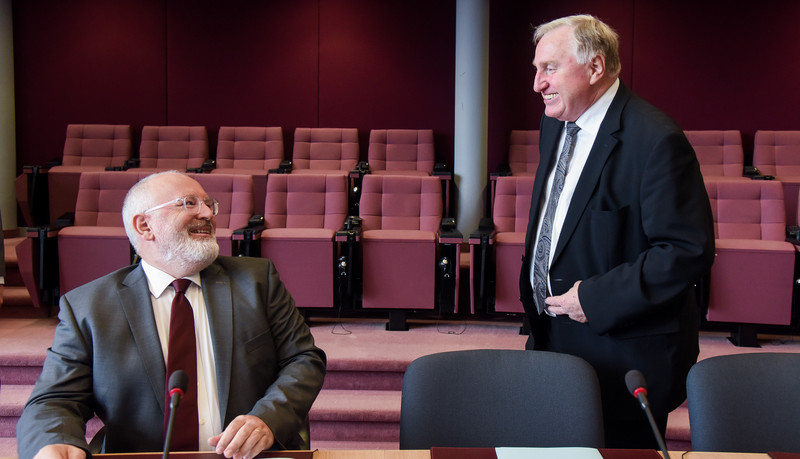
EU Observer (16 October 2018)
The president of one EU institution will not quickly publicly criticise the president of another one.
But when Karl-Heinz Lambertz, president of the Committee of the Regions (CoR), watched the annual State of the Union speech by European Commission president Jean-Claude Juncker last month, it did not quite contain what he expected.
In the preceding months Lambertz had been involved with a body - set up at the request of Juncker - which dealt with the issue of subsidiarity: the principle that decisions should be taken at the government level which can most effectively carry out that policy.
Lambertz had expected Juncker to publicly acknowledge the work of the group, called the Task Force on Subsidiarity, Proportionality and 'Doing Less More Efficiently'.
Instead, Juncker mentioned subsidiarity just once, in the context of his proposal to scrap the twice-annual change between summertime and wintertime.
"I'm very unhappy that he reduced the issue of subsidiarity to the summertime," Lambertz said, in an interview with EUobserver.
"Summertime is an interesting issue … but it is not a new way of handling subsidiarity," he added.
Lambertz met with EUobserver a total of six times in his office in Brussels over the past nine months - to discuss the work of the task force, which ended up with a set of recommendations on subsidiarity and proportionality. But it concluded that the popular call for 'less Europe' could not be put into practice.
The report was the practical result of one of Juncker's five scenarios for the future of Europe, presented last year.
January 2018
"The first meeting was really good," said Lambertz in a 29 January interview, a few days after the task force started its work.
It consisted of Juncker's right-hand man Frans Timmermans, plus members of national parliaments from Estonia, Austria, and Bulgaria, and three members from the Committee of the Regions.
All nine belonged to one of the three mainstream, pro-EU political families: the European People's Party (EPP), the Socialist & Democrats (S&D); and the Alliance of Liberals and Democrats (ALDE).
But the CoR president said political colours did not play a role in the selection of the members from his institution.
"[Michael] Schneider is not there fundamentally because he is EPP, he is there because he is our coordinator on subsidiarity for a long time. I am there because I am the president of the Committee of the Regions. And [Francois] Decoster is there because he is the vice-president of Civex," he said.
Civex is the Committee of Regions' Commission for Citizenship, Governance, Institutional and External Affairs.
Lambertz, who was minister-president of the German-speaking community of Belgium for 15 years, rejected the point that the group should have necessarily included someone from the further left or right side of the political spectrum, or someone with more eurosceptic views.
"It is not the place where we will discuss fundamentally between eurosceptics and pro-Europeans," he said.
March
But the issue which is at the heart of Lambertz' discussions is of keen interest to eurosceptics – even if they may be put off by the EU jargon.
"The fundamental question is always: where is the 'European added value' if Europe does something? That is subsidiarity," he said in March.
He went on: "Proportionality is: if 'Europe' has to do something - how must it happen?"
Lambertz acknowledged that these questions cannot be answered scientifically.
"The decision 'is there a European added value' will be always a political decision. It is very important to know that," he said.
He noted that the task force was looking for a way to answer the subsidiarity and proportionality questions more objectively – though with a caveat.
"It is very important to say there is no miraculous formula where you have a system and you put the question in and the answers come out – no."
May
One of the instructions Juncker gave the task force was to identify "any policy areas where, over time, decision-making and/or implementation could be re-delegated, in whole or in part, or definitively returned to the member states".
But after five meetings and a public hearing, the group was nowhere near finding such policy areas.
Commission vice-president Frans Timmermans at a public hearing at the Committee of Regions premises, asking for ideas on 'doing less' (Photo: European Committee of the Regions)
At the hearing, held on 28 May, Timmermans made what seemed almost a desperate plea.
"You would really help us if you could just give us some concrete ideas of areas or specific subjects where you could say: 'it made perfect sense 20 years ago for the EU to be active in this area, now it would be better to leave this up to the regions or the member states'," said Timmermans.
"I would love to have a number of those subjects," Timmermans added.
'Do less'? No can do
But for the Committee of the Regions this type of 'doing less' was not the main issue.
"Because we always say: the real problem is not doing more or less, the real problem is to do the correct things on the indicated level," he said.
In a Kafka-esque twist, certain to delight eurosceptics, Lambertz noted that the conclusion of the 'do less' task force could even be that more needs to be done at EU level.
To Lambertz, 'doing less' means something else...
The German-speaking Belgian pulled out a German word: 'Regelungsdichte' – the density of regulation.
Europe is prescribing too many details, he said.
June
Another problem identified by the task force was that the issue of subsidiarity was only discussed at the start of the legislative 'train', when the commission presents its proposal.
"We are deeply convinced that the satisfaction of everyone in the field of subsidiarity depends not only what happens in the beginning. It depends first of all what is the result," said Lambertz, referring to the three-way talks between commission, parliament, and Council of the EU, known as trilogues.
The June meeting also discussed the draft report.
"We will bring the result to the table in the middle of July. Then we will have a next step, an important one: the State of the Union [address]," said Lambertz.
"I hope and I am sure that Juncker will say something about this issue in his State of the Union."
July
The task force indeed wrapped up its work by handing of the final report to Juncker on 10 July – within the deadline.
Commission vice-president Frans Timmermans officially presents the task force's report to his boss, Jean-Claude Juncker. To his right stands Karl-Heinz Lambertz (Photo: European Commission)
The report, titled Active Subsidiarity: A New Way of Working, answered the question of 'can we have less Europe' with a resounding 'No'.
"There is EU value added in all existing areas of activity and the task force did not, therefore, identify any treaty competences or policy areas that should be re-delegated definitively, in whole or in part, to the member states," the report said.
It included several recommendations - including the use of all EU institutions and national, regional, and local authorities, of a so-called subsidiarity grid, which is aimed to creating a common understanding of subsidiarity.
The group even included a model grid – although it was more of a questionnaire than a grid.
September
12 September: Juncker presents his State of the Union speech in Strasbourg (Photo: European Commission)
"Clock-changing must stop," said Juncker in his State of the Union speech.
"Member states should themselves decide whether their citizens live in summer or winter time. It is a question of subsidiarity," he added.
This was his only mention of subsidiarity.
Two weeks later, Lambertz told EUobserver this surprised him.
"I'm not sure that the future of Europe is linked to the choice of one member state [not] to have the same timezone [as] Brussels," he said.
But he also excused Juncker - saying that he had no choice but to leave many important issues out of his speech.
Lambertz then took an optimistic turn, saying that his disappointment was not that great, because Juncker had also not rejected the task force's outcome.
He also noted that Austria, which holds the rotating EU presidency until the end of the year, has made subsidiarity one of its priorities.
In mid-November, Austria is organising a two-day conference in Bregenz, devoted fully to subsidiarity.
"It will come back," said Lambertz.
No comments yet.
- ITALY SENDS EU COMMISSION DISPUTED BUDGET PROPOSAL Europe - EU 16.10.2018
-
 ‘NEW SOUTHERN POLICY’ ENCOURAGES FINANCIAL COMPANIES TO LOOK TO SOUTHEAST ASIA
Asia - Pacific
16.10.2018
‘NEW SOUTHERN POLICY’ ENCOURAGES FINANCIAL COMPANIES TO LOOK TO SOUTHEAST ASIA
Asia - Pacific
16.10.2018
-
 HOW JUNCKER'S 'DO LESS' GROUP CONCLUDED EU SHOULD NOT DO LESS
Europe - EU
16.10.2018
HOW JUNCKER'S 'DO LESS' GROUP CONCLUDED EU SHOULD NOT DO LESS
Europe - EU
16.10.2018
- ROMANIAN PM: COOPERATION BETWEEN ROMANIA AND TURKEY IS VERY HIGH The Balkans 16.10.2018
- POLAND, CZECH REPUBLIC AGAINST EU BORDER GUARD PLAN Europe - EU 16.10.2018
-
19.04.2024
Türk-Ermeni İlişkileri Üzerine Ömer Engin Lütem Konferansları 2023 -
11.04.2023
Türk-Ermeni İlişkileri Üzerine Ömer Engin Lütem Konferansları 2022 -
27.03.2023
RADİKAL ERMENİ UNSURLARCA GERÇEKLEŞTİRİLEN MEZALİMLER VE VANDALİZM -
17.03.2023
PATRIOTISM PERVERTED -
23.02.2023
MEN ARE LIKE THAT -
03.02.2023
BAKÜ-TİFLİS-CEYHAN BORU HATTININ YAŞANAN TARİHİ -
16.12.2022
INTERNATIONAL SCHOLARS ON THE EVENTS OF 1915 -
07.12.2022
FAKE PHOTOS AND THE ARMENIAN PROPAGANDA -
07.12.2022
ERMENİ PROPAGANDASI VE SAHTE RESİMLER -
30.03.2022
Türk-Ermeni İlişkileri Üzerine Ömer Engin Lütem Konferansları 2021 -
01.01.2022
A Letter From Japan - Strategically Mum: The Silence of the Armenians -
01.01.2022
Japonya'dan Bir Mektup - Stratejik Suskunluk: Ermenilerin Sessizliği -
11.02.2021
Türk-Ermeni Uyuşmazlığı Üzerine Ömer Engin Lütem Konferansları 2020 -
03.06.2020
Anastas Mikoyan: Confessions of an Armenian Bolshevik -
08.04.2020
Sovyet Sonrası Ukrayna’da Devlet, Toplum ve Siyaset - Değişen Dinamikler, Dönüşen Kimlikler -
18.03.2020
Türk-Ermeni Uyuşmazlığı Üzerine Ömer Engin Lütem Konferansları 2019 -
08.03.2019
Türk-Ermeni Uyuşmazlığı Üzerine Ömer Engin Lütem Konferansları 2018 -
12.06.2018
Ermeni Sorunuyla İlgili İngiliz Belgeleri (1912-1923) - British Documents on Armenian Question (1912-1923) -
02.12.2016
Turkish-Russian Academics: A Historical Study on the Caucasus -
01.07.2016
Gürcistan'daki Müslüman Topluluklar: Azınlık Hakları, Kimlik, Siyaset -
10.03.2016
Armenian Diaspora: Diaspora, State and the Imagination of the Republic of Armenia -
24.01.2016
Ermeni Sorunu Temel Bilgi ve Belgeler (2. Baskı)
-
AVİM Conference Hall 24.01.2023
CONFERENCE TITLED “HUNGARY’S PERSPECTIVES ON THE TURKIC WORLD"









